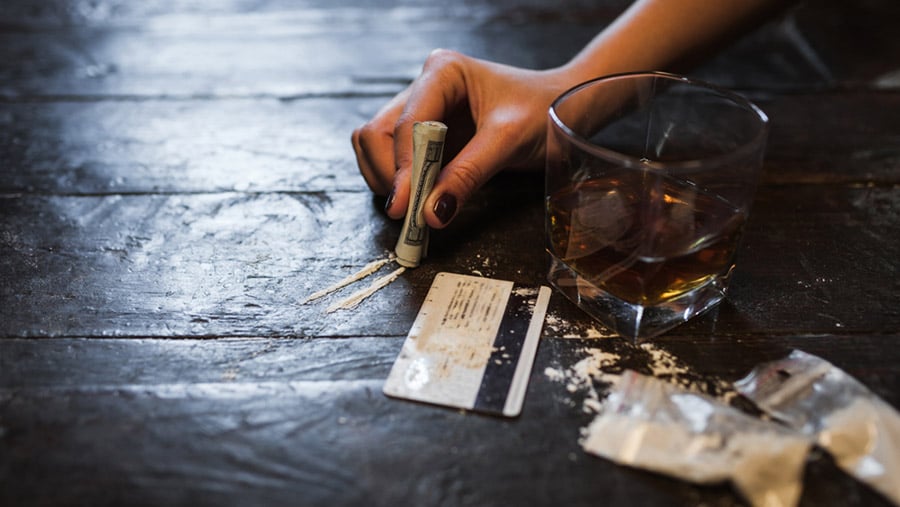Polysubstance Use: Alcohol and Cocaine
In studies regarding drug abuse, an estimated 90% of individuals who are dependent on cocaine are also dependent on alcohol. In fact, this combination of drugs has become a very popular form of polysubstance use causing alarming effects leading to addiction, overdose and sometimes death. Many individuals who use both alcohol and cocaine, believe the combination will create a boost in euphoric sensations from the cocaine and help avoid any negative withdrawal symptoms. Users generally believe the combination of both alcohol and cocaine will help enhance each other’s desired effects while counteracting each other’s negative side effects. In reality, it is not the case.

A substance that is illegal on all fronts, cocaine is an extract that comes from the leaves of a South American coca plant. Affecting the central nervous system, this stimulant drug is known to come in three different forms: powdered cocaine, “crack” cocaine and freebase cocaine. Cocaine speeds up the messaging between your body and brain, leading to increased brain activity, feelings of energy and alertness, increased dopamine and a more sensitive reaction to lights, sounds and touch. When it comes to the unwanted and negative side effects of cocaine, users can expect to feel a rise in body temperature, accelerated heart rate, restlessness, anxiety and depression, paranoia and even panic attacks.
Check Your Insurance Coverage for FREE
Find out if your insurance covers addiction treatment in minutes. We accept most insurance!
Alcohol is a depressant substance that also affects the central nervous system, which works by slowing down brain and body activity creating the euphoric sensation of calm and relaxation. Symptoms of alcohol use include impaired thinking and judgment, decrease in reaction time, slurred speech, loss of coordination and even blackouts and memory loss. A highly addictive substance due to its ability to physically alter normal brain functions, alcohol can greatly impact other organ functions, leading to heart disease, liver disease and cancer. Using alcohol can also increase cravings for cocaine making it more difficult to quit either substance, leading to an endless cycle of misuse and addiction.
One contributing factor to the popularity of this drug combination is the fact that they make a common appearance in the nightlife and club life scene. Alcohol and cocaine are often associated with the partying lifestyle where the environment is often fast-paced and high energy where people party all night or dance all night.
Reach out to Hotel California by the Sea
We specialize in treating addiction and other co-occurring disorders, such as PTSD. Our Admissions specialists are available to walk you through the best options for treating your addiction.
When combined, alcohol and cocaine create a substance that is known as cocaethylene. This substance, which is 30% more toxic than cocaine, increases the toxicity of both substances and remains in your system longer. Despite being different types of drugs, both substances are similar in their ability to change, enhance and modify the effects on a person’s mood, feelings and behaviors. Polydrug users often have built up a high tolerance for the drugs making it more difficult to stop using despite its detrimental toll on the physical body and especially mental health. Professional behavioral health care providers such as Hotel California by the Sea, provide a comprehensive and individualized treatment care plan to all of their clients to ensure a happier and healthier life in recovery.
Hotel California by the Sea offers a full spectrum of care including detox and residential care, outpatient services, various specialized therapeutic treatments and unique social services. By treating all aspects of the addiction including physical, emotional and social, a well-rounded and comprehensive treatment plan will yield the most promising results when it comes to sobriety and health. While receiving treatment at an inpatient or outpatient facility, clients choose from EMDR therapy, group therapy sessions, marriage and family support services as well as educational and career resource services. Each client is unique in their needs for recovery and with the ability to choose what treatments may work best for them, they are more likely to be successful on their recovery journey.
References:
https://www.medicalnewstoday.com/articles/cocaine-and-alcohol#combining-both
https://www.goodrx.com/well-being/substance-use/mixing-cocaine-and-alcohol
https://www.healthline.com/health/cocaine-and-alcohol
